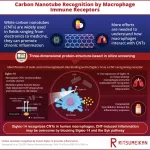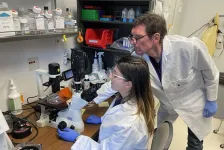(Press-News.org) Currently, 12.5% of U.S. adults smoke cigarettes. At the same time, more than one-third of U.S. adults seek health information online, making social media a potentially powerful platform for anti-tobacco campaigns. However, limited research has been done on effective social media strategies for anti-smoking campaigns.
An interprofessional Mason research team led by Associate Professors in the Department of Health Administration and Policy Hong Xue and Gilbert Gimm found that the most popular anti-tobacco campaigns on Facebook were informational and discussed the negative effects of smoking. New information about harmful chemicals and the risks of second-hand smoke on pets were the most engaged with posts.
“Our results show that people respond to messaging on how smoking negatively affects the lives of those they care about, including pets. Messages that are personally meaningful to smokers can help to generate positive behavioral changes among smokers,” said Xue, the principal investigator. “Anti-tobacco campaigns can use these findings to improve their campaigns, better engage the public, and more effectively promote reasons to stop smoking.”
This is the first large-scale social media data mining study that examined key anti-tobacco campaigns in the United States. Researchers also found that large campaigns from government and nonprofit organizations had more user engagement compared to smaller and local campaigns. Facebook users were much more likely to engage in campaign messages with videos.
“Social Media Data Mining of Antitobacco Campaign Messages: Machine Learning Analysis of Facebook Posts” was published in The Journal of Medical Internet Research in February 2023. The project was funded by a research grant from the Virginia Foundation for Healthy Youth.
From Mason, Professor Xiaoquan Zhao in the Department of Communication, Professor Hemant Purohit in the Department of Information Sciences and Technology, and doctoral student Shuo-yu Lin were also researchers on the study. Researchers from Virginia Commonwealth University, Slippery Rock University of Pennsylvania, and Changshu Institute of Technology (China) also contributed to the study.
END
Anti-smoking campaigns on Facebook that discuss the risks of second-hand smoking to pets receive the most user engagement
An interprofessional Mason research team used machine learning and social media data in the first large-scale study to analyze factors that influence effective antismoking campaigns and user engagement
2023-04-06
ELSE PRESS RELEASES FROM THIS DATE:
Kessler Foundation receives Craig H. Neilsen grant to improve return-to-work and employment outcomes for inpatients with spinal cord injury
2023-04-06
East Hanover, NJ – April 6, 2023 – Ada Chen, PhD, at Kessler Foundation was awarded a two-year grant for $187,000 from the Craig H. Neilsen Foundation to improve the return-to-work rate and employment outcomes for inpatients with spinal cord injury (SCI). Her study is titled “Employment after SCI: Stakeholder Perceptions and Experiences of Vocational Resource Facilitation.”
“The Vocational Resource Facilitation (VRF) pilot project – developed as an early intervention – has already shown promising outcomes in improving return-to-work rates,” said Dr. Chen. “Further investigation of VRF participant and stakeholder experiences and perceptions ...
Novel immunotherapy agent safe, shows promise against high-risk prostate cancers
2023-04-06
FOR IMMEDIATE RELEASE
A new drug, a monoclonal antibody known as enoblituzumab, is safe in men with aggressive prostate cancer and may induce clinical activity against cancer throughout the body, according to a phase 2 study led by investigators at the Johns Hopkins Kimmel Cancer Center and its Bloomberg~Kimmel Institute for Cancer Immunotherapy. If confirmed in additional studies, enoblituzumab could become the first promising antibody-based immunotherapy agent against prostate cancer.
In a clinical trial, 32 men with high-risk or very high-risk prostate cancers who were scheduled ...
Fiery response: “Siglec-14” receptors on human macrophages detect carbon nanotubes and provoke inflammation, finds study
2023-04-06
Carbon nanotubes (CNTs) have become a mainstay of the field of nanotechnology. Finding innovative applications across materials science, electronics, and medicine, CNTs have garnered a lot of attention from researchers in recent years. However, the International Chemical Secretariat (ChemSec) has moved to flag CNTs on the “Substitute It Now!” database of chemicals likely to be restricted for use. In fact, due to their persistence in nature and potential toxicity to humans, ChemSec has proposed that adequate assessments of CNTs' risk to human health are urgently needed.
Following their entry into the body, and much like asbestos, CNTs are targeted by the immune system and preferentially ...
Alternative glucose breakdown ensures the survival of cancer cells
2023-04-06
A key enzyme in sugar metabolism is inactivated particularly easily and efficiently by oxidative stress. Scientists at the German Cancer Research Center (Deutsches Krebsforschungszentrum, DKFZ) have now shown that with this oxidation, cells switch to an alternative sugar breakdown pathway and can thus escape oxidative stress. Cancer cells in particular benefit from this mechanism, which can also protect them from therapy-related damage.
One of the central enzymes in sugar breakdown, GAPDH (glyceraldehyde-3-phosphate dehydrogenase), ...
Super-sized nanocage could deliver bigger drug cargoes
2023-04-06
Think about how frustrating it is to try to fit a gift into a box that is too small. Sometimes you just need a bigger box.
Building a bigger box
Nanocages are tiny artificial containers that can be used to deliver therapeutics to a target destination in the body. But some drug molecules are like gifts that are too big for a standard-sized nanocage ‘box’. Now, in an article published today in Nature Synthesis, researchers from the University of Cambridge describe how they have built a super-sized nanocage that could be used to deliver larger drug cargoes. They have built a bigger box.
Simple building blocks
Rational control over the self-assembly of these types of cages generally ...
Shedding light on mechanisms of electrochemical energy storage
2023-04-06
Understanding why certain materials work better than others when it comes to energy storage is a crucial step for developing the batteries that will power electronic devices, electric vehicles and renewable energy grids. Researchers at Drexel University have developed a new technique that can quickly identify the exact electrochemical mechanisms taking place in batteries and supercapacitors of various compositions — a breakthrough that could speed the design of higher performing energy storage devices.
Reported in Nature Energy, the Drexel team’s ...
Researchers tackle major obstacle to stem-cell heart repair
2023-04-06
Researchers at the University of Washington School of Medicine in Seattle have engineered stem cells that do not generate dangerous arrhythmias, a complication that has to date thwarted efforts to develop stem-cell therapies for injured hearts.
“We have found what we have to tackle to make these cells safe,” said Silvia Marchiano, a postdoctoral fellow in the laboratory of Chuck Murry at the UW Medicine Institute for Stem Cell and Regenerative Medicine. Marchiano is the lead author of a paper describing the findings published Thursday, April ...
Twinkling stars fuel interstellar dust
2023-04-06
Of the many different kinds of stars, asymptotic giant branch (AGB) stars, usually slightly larger and older than our own sun, are known producers of interstellar dust. Dusty AGBs are particularly prominent producers of dust, and the light they shine happens to vary widely. For the first time, a long-period survey has found the variable intensity of dusty AGBs coincides with variations in the amount of dust these stars produce. As this dust can lead to the creation of planets, its study can shed light on our own origins.
You’ve probably heard of the James Webb Space Telescope (JWST) which ...
The hidden role of food in urban conflicts in Central America
2023-04-06
Extreme water events have been shown to affect human security in many ways. In a research article published today in the new journal Nature Water researchers from Politecnico di Milano and University of California at Berkeley delve deeper into the complex nexus between droughts and conflicts in Central America. For the decades from 1996 to 2016 explore how water availability affects agricultural production and food security, and investigate the nexus between drought-induced food insecurity and the emergence of conflict in the region. Cities in ...
Fasting diet reduces risk markers of type 2 diabetes
2023-04-06
A fasting diet which focuses on eating early in the day could be the key to reducing the risk of developing type 2 diabetes.
Researchers from the University of Adelaide and South Australian Health and Medical Research Institute (SAHMRI) compared two different diets: a time restricted, intermittent fasting diet and a reduced calorie diet to see which one was more beneficial for people who were prone to developing type 2 diabetes.
“Following a time restricted, intermittent fasting diet could help lower the chances of developing type 2 diabetes,” said ...
LAST 30 PRESS RELEASES:
Brain cells drive endurance gains after exercise
Same-day hospital discharge is safe in selected patients after TAVI
Why do people living at high altitudes have better glucose control? The answer was in plain sight
Red blood cells soak up sugar at high altitude, protecting against diabetes
A new electrolyte points to stronger, safer batteries
Environment: Atmospheric pollution directly linked to rocket re-entry
Targeted radiation therapy improves quality of life outcomes for patients with multiple brain metastases
Cardiovascular events in women with prior cervical high-grade squamous intraepithelial lesion
Transplantation and employment earnings in kidney transplant recipients
Brain organoids can be trained to solve a goal-directed task
Treatment can protect extremely premature babies from lung disease
Roberto Morandotti wins prestigious Max Born Award for pioneering research in quantum photonics
Scientists map brain's blood pressure control center
Acute coronary events registry provides insights into sex-specific differences
Bar-Ilan University and NVIDIA researchers improve AI’s ability to understand spatial instructions
New single-cell transcriptomic clock reveals intrinsic and systemic T cell aging in COVID-19 and HIV
Smaller fish and changing food webs – even where species numbers stay the same
Missed opportunity to protect pregnant women and newborns: Study shows low vaccination rates among expectant mothers in Norway against COVID-19 and influenza
Emotional memory region of aged brain is sensitive to processed foods
Neighborhood factors may lead to increased COPD-related emergency department visits, hospitalizations
Food insecurity impacts employees’ productivity
Prenatal infection increases risk of heavy drinking later in life
‘The munchies’ are real and could benefit those with no appetite
FAU researchers discover novel bacteria in Florida’s stranded pygmy sperm whales
DEGU debuts with better AI predictions and explanations
‘Giant superatoms’ unlock a new toolbox for quantum computers
Jeonbuk National University researchers explore metal oxide electrodes as a new frontier in electrochemical microplastic detection
Cannabis: What is the profile of adults at low risk of dependence?
Medical and materials innovations of two women engineers recognized by Sony and Nature
Blood test “clocks” predict when Alzheimer’s symptoms will start
[Press-News.org] Anti-smoking campaigns on Facebook that discuss the risks of second-hand smoking to pets receive the most user engagementAn interprofessional Mason research team used machine learning and social media data in the first large-scale study to analyze factors that influence effective antismoking campaigns and user engagement



